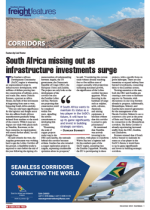Ma nagement and control of African freight transport corridors will require digitisation of procedures to ensure there is a free f low of goods through borders and from supplier to final customer.Ify Ogo, regional specialist at the African Continental Free Trade Area (AfCFTA) secretariat, says it is critically important to address gaps in the interoperability of existing digital platforms. “African governments are increasingly embracing digitalisation for trade facilitation, especially in the form of digital portals. “These various existing portals can be improved to interact with/connect to others around the continent. “In this light, the African Union Commission is leading efforts on regional interoperability which can be supported to scale up and accelerate.”There is a drive to digitise all aspects of corridor operations, which includes transport by road, rail, air and water.The first steps towards a harmonised road transport regulatory framework were taken in April 2023 at a continental workshop hosted in Johannesburg.Speakers at the workshop emphasised the importance of digital systems to improve road transport by improving efficiency, limit corruption and facilitate the sharing of information between logistics companies, trade entities and operators.The initial focus is road transport because some 80% of AfCFTA trade moves on rubber.Progress towards reaching the goal includes the creation of a database of 79 African development corridors which includes 184 projects on railways, wet and dry ports, pipelines, airports, techno-cities, and industrial parks, according to the database authors.The African Development Corridors database can be found at https://dcp-unep-wcmc.opendata.arcgis.com.Support from private enterprise is needed to develop smart corridors as governments do not have the resources or skills to implement digitisation on their own.In November 2023 the Southern African Railways Association (Sara) and Huawei signed a Memorandum of Understanding to create a non-exclusive framework to digitise all the Sara corridors.“Given the importance of the logistics sector in supporting businesses, digital transformation will be critical to enabling increased economic growth and development. However, the sector has faced challenges such as poor infrastructure, a lack of end-to-end visibility, and inefficient processes, which have slowed its progress,” writes Lilian Nganda, Maersk head of customer communication and events, IMEA. “For the logistics industry, regions with high internet penetration and broadband access are primed for the incorporation of emerging internet-based technologies such as cloud computing to support supply chain management. “Countries that are just beginning to strengthen their internet access, on the other hand, present an opportunity for logistics players to build relevant solutions as critical infrastructure is laid out.”African governments are increasingly embracing digitalisation for trade facilitation, especially in the form of digital portals.

